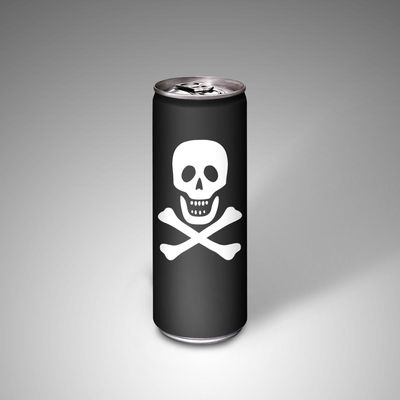
Yesterday, a lawyer for the family of a 14-year-old girl who died after drinking Monster energy drinks revealed that the FDA had linked them to at least five deaths during the last year. But Monster isn’t the only energy drink that’s faced such claims over the years. In fact, a look back over the past decade reveals plenty of grim stories related to the super-caffeinated cans of sugar water.
November 15, 2000: A jury in Dublin questioned the role of Red Bull in the death of an 18-year-old athlete a year earlier. Ross Cooney collapsed during a basketball game just a few hours after sharing three cans of the energy drink. The official cause: sudden adult death syndrome.
July 12, 2001: The BBC reported that Red Bull was under investigation in Sweden following three deaths. Two of the three victims drank Red Bull mixed with vodka, and the third died after consuming several cans of Red Bull post-workout.
September 2006: A 40-year-old man from Wheatley, Oxford, suffered a fatal heart attack in the supermarket where he worked. He reportedly drank four cans of Red Bull a day. A pathologist reported that the man had an enlarged heart, and while he did not drink enough caffeine to be fatal under normal circumstances, the high levels may have contributed to his death.
September 30, 2008: February 4, 2010: Dakota Sailor regretted trying NOS for the first time after two cans of the stuff triggered a seizure. The 17-year-old, who had regularly enjoyed Red Bull and Monster, spent five days in the hospital and vowed to stay away from energy drinks, whatever the brand.
September 17, 2010: A Florida State University sophomore fatally shot himself after drinking three cans of Four Loko during a “30-hour partying binge.” His parents later filed a wrongful death suit against Phusion Projects, the makers of the now-illegal caffeinated alcohol.
September 25, 2010: A Chicago mother also sued Phusion Projects months after her son died in a similarly bizarre Four Loko-related incident. The 15-year-old ran into the middle of the street and was struck by an SUV after drinking two cans of Four Loko.
October 8, 2010: Nine Central Washington University students wound up in the hospital after experiencing symptoms akin to those felt by victims of date rape drugs at a weekend party. The culprit? Four Loko, fittingly nicknamed “blackout in a can.”
November 14, 2010: A 14-year-old girl was killed when the SUV her boyfriend was driving crashed into a guardrail. The driver, also 14, had been drinking — you guessed it! — Four Loko, prompting the FDA to call caffeine an “unsafe food additive.”
Earlier: Monster Energy Drinks Linked to at Least Five Deaths




